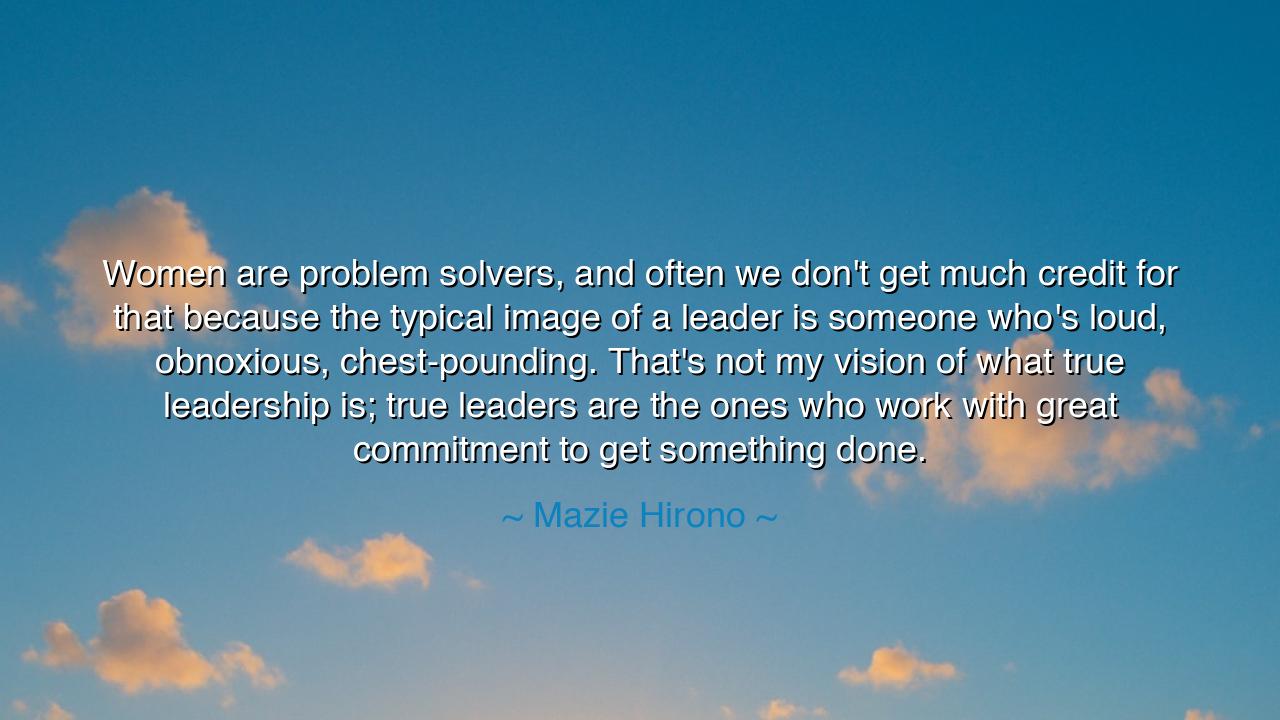
Women are problem solvers, and often we don't get much credit for
Women are problem solvers, and often we don't get much credit for that because the typical image of a leader is someone who's loud, obnoxious, chest-pounding. That's not my vision of what true leadership is; true leaders are the ones who work with great commitment to get something done.






“Women are problem solvers, and often we don't get much credit for that because the typical image of a leader is someone who's loud, obnoxious, chest-pounding. That's not my vision of what true leadership is; true leaders are the ones who work with great commitment to get something done.” – Mazie Hirono
In these wise and heartfelt words, Mazie Hirono, the first woman of Asian ancestry elected to the U.S. Senate, speaks not only as a leader but as a witness to the quiet strength of women across generations. Her message pierces through the illusions of what society has long mistaken for leadership—the noise of arrogance, the spectacle of ego—and reveals a deeper truth: that true leadership is not performed upon the stage of pride, but carried out in the silent labor of purpose. To lead, she reminds us, is not to dominate, but to solve, to mend, to uplift—to take the chaos of life and bring forth order through compassion and perseverance.
The meaning of this quote reaches far beyond gender; it touches the soul of what it means to serve. Hirono calls upon us to rethink the image of the leader as the loudest voice in the room, as the one who commands attention through power or bluster. She honors instead those who lead with commitment, patience, and resolve, those who work steadily to “get something done.” These are the true architects of progress—the women and men who repair what is broken, not for glory, but for good. Her words celebrate a form of power that is too often overlooked: the strength of calm determination, the courage of quiet conviction.
The origin of this insight comes from Hirono’s own journey. Born in Japan and raised in poverty in Hawaii, she learned leadership not from textbooks or titles, but from her mother, who fled an abusive marriage to give her children a better life. From that experience, Hirono came to understand that leadership is not about commanding others—it is about enduring hardship and turning it into purpose. When she entered politics, she encountered a world that equated leadership with aggression and dominance, a world that rewarded volume over virtue. Yet she chose a different path—the path of problem solving, of thoughtful service, of steadfast care. In her life’s work, she has shown that the greatest leaders do not shout to be seen; they listen to understand.
History, too, offers echoes of Hirono’s wisdom. Consider Eleanor Roosevelt, who reshaped the role of the First Lady not through grand speeches or displays of power, but through relentless advocacy for human rights. Her leadership was humble yet transformative, born from empathy rather than authority. Or think of Florence Nightingale, who revolutionized medicine by organizing hospitals and improving hygiene during the Crimean War—an act of leadership rooted not in command, but in compassion. These women, like Hirono, redefined what it means to lead: they were problem solvers, driven not by ego, but by an unyielding sense of duty to humanity.
Hirono’s words also carry a profound critique of perception. Society has long been conditioned to see leadership through a masculine lens—loud, confrontational, commanding. But true power, as she reminds us, often flows in quieter streams. The mother who holds a fractured family together, the teacher who awakens young minds, the nurse who endures exhaustion to save lives—these are acts of leadership no less noble than those of generals or presidents. To ignore them is to misunderstand the essence of leadership itself. Commitment, not charisma, is the heart of greatness.
Yet her message is not one of resentment, but of redefinition. She calls upon both women and men to broaden their vision of what it means to lead. The world does not need more noise—it needs wisdom. It does not need more pride—it needs purpose. Leadership that shouts may command attention, but leadership that listens commands trust. And in a world riven by division and ego, it is the problem solvers, the builders, the healers, who hold civilization together.
The lesson of Hirono’s quote is both timeless and revolutionary: to lead is to serve, to commit, to care. If you would be a leader, do not chase the image of power—embody its truth. Let your actions, not your voice, define you. Be the one who shows up when others falter, who works when others argue, who builds when others boast. Leadership is not about being seen; it is about making a difference. And though the world may not always reward quiet strength, it is such strength that sustains the world itself.
Thus, as Mazie Hirono teaches, leadership is not a performance but a practice. It is not the roar of the lion, but the steady heartbeat of the shepherd who guides her flock through the storm. The truest leaders—especially the women who have led against all odds—remind us that greatness is not measured in decibels, but in deeds. Let us honor them not with applause, but by following their example: to face problems with courage, to serve with integrity, and to labor, patiently and passionately, until the work is done.






AAdministratorAdministrator
Welcome, honored guests. Please leave a comment, we will respond soon